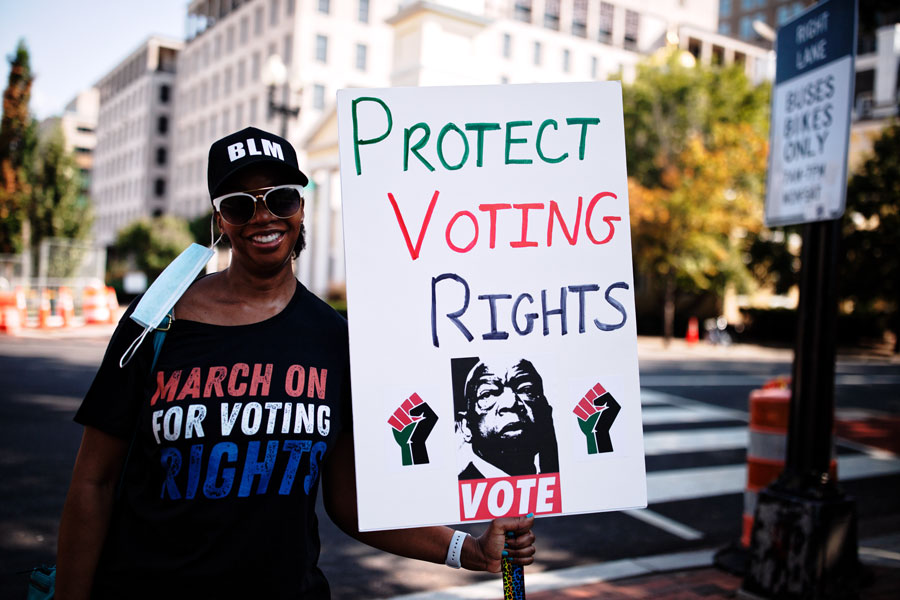
WASHINGTON, DC – On October 15, 2025, the U.S. Supreme Court reheard arguments in Louisiana v. Callais, a case centering on how far states may use race when drawing electoral maps under Section 2 of the Voting Rights Act (VRA). The stakes are significant: the Court’s decision could reshape how minority representation is protected in future redistricting efforts nationwide.
The case has a complex history. After the 2020 census, Louisiana’s legislature adopted a congressional map criticized for diluting Black voting power. A federal court found the map violated Section 2 and ordered remedial changes, leading the state to adopt a new plan that created a second majority-Black district. But that revised map itself became the subject of a new legal challenge, with opponents arguing it was a racial gerrymander in violation of the U.S. Constitution. Louisiana eventually reversed course and declined to defend its own map at the Supreme Court level, leaving opposition to come from civil rights groups and minority coalitions.
During the oral arguments, several conservative justices appeared skeptical of long-standing precedents that allow race-conscious redistricting to remedy discrimination. They questioned whether those remedies should be indefinite and whether they align with equal protection principles. Meanwhile, liberal justices and civil rights advocates warned that scaling back Section 2 would imperil hard-won gains for minority representation in states with racially polarized voting patterns.
Observers interpreted the tenor of the arguments as signaling that the Court might narrow the scope of Section 2 rather than strike it down entirely-potentially by imposing stricter standards for when race may be used in mapmaking, or setting temporal limits on race-based remedies.
A final ruling is expected by the end of the Court’s term in June 2026. Many advocates warn that a decision weakening Section 2 could invite more aggressive gerrymandering in states controlled by partisan legislatures.
Key Facts & Context
| Topic | Details |
|---|---|
| Case Name & Docket | Louisiana v. Callais (consolidated with Robinson v. Callais), docket numbers 24-109 / 24-110. |
| Legal Question | Whether the creation of a second majority-Black district under the VRA is permissible under the Constitution (Fourteenth and Fifteenth Amendments), and whether Section 2’s remedial role should be limited. |
| Oral Arguments Date | Initially argued March 24, 2025; reheard October 15, 2025. |
| State’s Position Shift | Louisiana reversed its earlier support for the remedial map and instead contended that race-based mapmaking violated constitutional principles. |
| Supreme Court Dynamics | Conservative justices questioned long-term race-based remedies and pushed to tighten standards; liberal justices defended continued use of Section 2 in states with racially polarized voting. |
| Potential Impact | A narrowing of Section 2 could undermine protections in dozens of congressional maps across states, especially those with significant minority populations. |
| Other Related Developments | Legal scholars and civil rights organizations are preparing for cascading challenges in redistricting cases nationwide should relief granted be scaled back. |
Timeline: Louisiana v. Callais & Related Proceedings
| Date / Period | Event | Significance / Notes |
|---|---|---|
| January 31, 2024 | Plaintiffs (12 individuals) file suit in the Western District of Louisiana | The challenge targets Louisiana’s newly enacted congressional redistricting plan, alleging violations of the Fourteenth and Fifteenth Amendments. |
| April 8–10, 2024 | Consolidated preliminary injunction hearing and trial before three-judge federal court | The court considers whether the enacted map violates constitutional protections and whether race predominated in legislative redistricting choices. |
| April 30, 2024 | Lower court decision in Robinson v. Callais (consolidated) | The three-judge panel rules for the challengers, finding that the redrawn map is unconstitutional as a racial gerrymander. |
| August 1, 2024 | Supreme Court docket entry (24-110) for Robinson v. Callais | The Supreme Court formally consolidates Robinson with Louisiana v. Callais for consideration. |
| Sep 18 – Nov 4, 2024 | SCOTUS signals probable jurisdiction; consolidates cases | The Court consolidates the appeals, noting probable jurisdiction in case 24-109 and 24-110. |
| March 24, 2025 | First round of oral argument at the Supreme Court | The parties present arguments over the constitutionality of the map, the role of Section 2 of the Voting Rights Act, and whether race predominated in the legislature’s decisions. |
| June 27, 2025 | Supreme Court orders reargument | Rather than issue a decision, the Court calls for a second round of oral argument and asks supplemental briefing on particular constitutional questions (e.g. whether race-based redistricting as a remedy violates the 14th/15th Amendments). |
| October 15, 2025 | Re-argument at the Supreme Court | The case is reargued in the fall term, focusing more sharply on the boundaries of permissible race-conscious redistricting and the limits of Section 2. |
| By June 2026 (expected) | Decision expected | The Court is anticipated to issue a decision by the end of its term, with potentially sweeping implications for redistricting and minority representation. |


